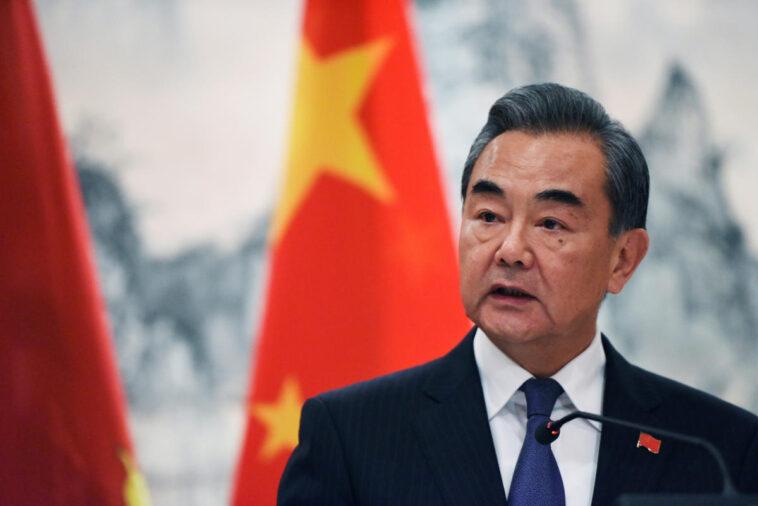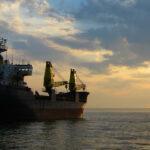Chinese Foreign Minister Wang Yi told senior European officials on Friday that China respects the sovereignty of countries, including Ukraine’s, but Russia’s concerns about NATO’s eastward expansion must be addressed. adequately.
Following weeks of warnings from Western leaders, Russian President Vladimir Putin on Thursday launched an invasion of Ukraine from the north, east, and south in the biggest attack on a European state since World War II.
Weeks before the invasion, China and Russia announced a strategic partnership, and Beijing has so far shied away from condemning Moscow’s actions.
Wang said that the current situation in Ukraine is not something that Beijing wants to see and that he would welcome a direct dialogue between Russia and Ukraine as soon as possible.
“China firmly advocates respecting and safeguarding the sovereignty and territorial integrity of all countries,” Wang said, according to a Chinese Foreign Ministry statement. “This applies equally to the Ukraine issue.”
Wang held separate calls with British Foreign Secretary Liz Truss, European Union foreign affairs chief Josep Borrell and a French presidential adviser.
“In the face of five consecutive rounds of NATO ‘s eastward expansion, Russia’s legitimate security demands must be taken seriously and properly addressed, ” Wang said, according to the statement.
The UN Security Council is due to vote on Friday on a resolution condemning the invasion of Moscow.
Russia would veto the move, and Wang said China has historically opposed Council resolutions that apply sanctions or the use of force. He said the council should try to defuse the tension and “not encourage it.”
US President Joe Biden said Thursday that any country that supported Russia’s assault on Ukraine would be “tainted by association,” and Washington has said Chinese companies will face consequences if they try to help Moscow evade export controls imposed by Western countries.
China walks a diplomatic tightrope
China has previously signaled that it would not openly support a Russian takeover of Ukrainian territory.
Wang also told the Munich Security Conference that China believes that the sovereignty, independence and territorial integrity of all nations should be respected and safeguarded, stressing that Ukraine is no exception.
Along the same lines, China criticized Washington’s response on Wednesday, saying the new US sanctions amounted to “adding fuel to the fire” and were “irresponsible and immoral.”
On Tuesday, Wang held a phone call with US Secretary of State Antony Blinken, and in a statement issued by the Chinese Foreign Ministry, Beijing once again called on all parties to exercise restraint and resolve differences through dialogue and negotiation.
“China’s more measured response suggests Beijing’s balance in light of its relations with the United States and Russia,” said Zsuzsa Anna Ferenczy, a fellow at National Dong Hwa University in Taiwan and a former adviser to the European Parliament.
“Beijing is aware that seeing a conflict break out is not in its interest and Moscow is pressuring China to face some tough decisions. China’s balancing act is to protect its own interests,” he told DW.
Can Russia go too far for China?
At the opening of the Olympics earlier this month in Beijing, Putin met with Chinese President Xi Jinping, and the Chinese appeared to support Russia’s position on NATO expansion.
In a joint statement, Russia and China called on NATO to “ideologize Cold War approaches” and “respect the diversity of civilizational and historical cultural patterns” in other countries.
Although China is likely to work with Russia to push a shared narrative that undermines a global model of Western democracy, Moscow’s latest steps toward the conflict in Ukraine may be too much for Beijing’s preference for stability.
“Russia’s decision [to recognize the independence of Ukraine’s breakaway regions] should have come as a surprise to China, as just a few days ago Beijing advocated resolving the crisis through the Minsk process, which was derailed yesterday. “, said Danil Bochkov, an expert from the Russian Council.
Wen-Ti Sung, a professor at the Australian National University, said China also does not want Russia to launch major offensives against Ukraine as the move could create geopolitical uncertainties that Beijing wants to avoid as China prepares to reassert itself. on the world stage in the midst of the 20th National Party Congress later this year.
“2022 is the year of China’s power transition,” he said. “On top of that, since China and Russia are still seen as potential security concerns, a significantly stronger Russia is not something China really wants to see,” she added.
Sung said China would likely be comfortable with a limited Russian incursion into separatist-held areas in Ukraine, in line with the Kremlin’s current claims that Moscow’s troops are “peacekeepers.”
“If Russia goes full steam ahead, China will have more incentive to try to distance itself from Russia, so Beijing will not be seen as part of this along with a big violator of international norms,” he added.
China eyes Western response to Russia
Under President Xi, China has repeatedly claimed it will “reunite” Taiwan with the mainland, as Beijing considers the autonomous island a renegade province.
Although the situation with Russia and Ukraine is far from identical, experts have said that China could gain insight into the Western response to Moscow’s escalation in Ukraine and extrapolate to its agenda with Taiwan.
“Beijing could be collecting a lot of details now about how the West is reacting and coordinating its steps among allies,” Bochkov said.
“China can compile a pretty effective guide to any cultural escalations with the West, whether they are related to Taiwan or inspired by anything else,” he added.
Sung said that China will watch as the Ukraine-Russia crisis tests Western unity.
“The escalation of the Ukraine crisis shows that European countries and the United States have different priorities in terms of their geopolitical concerns,” Sung said.
“Whether Ukraine will become a test case exposing flaws within major Western countries and whether that will lead to a further decline in Western bloc cohesion is something China will watch closely.”
On Wednesday, Taiwanese President Tsai Ing-wen condemned Russia’s aggression against Ukraine during a meeting with her government.
Tsai said “external forces” were “trying to manipulate the situation in Ukraine and affect the morale of Taiwan society”, while urging her government to be “more attentive to cognitive warfare”.
The Taiwanese leader stressed that although the situation between Taiwan and Ukraine is fundamentally different, the foreign forces’ attempt to influence the situation in Ukraine may still affect the morale of Taiwan’s civil society.
Beijing said on Wednesday that any comparison between Taiwan and Ukraine showed a “lack of the most basic understanding of the history of the Taiwan issue.”
“Taiwan is not Ukraine,” Foreign Ministry spokeswoman Hua Chunying told a regular news conference, calling the island “an inalienable part of China’s territory.”
He added that it was “reckless” on Taiwan’s part to “turn the Ukraine issue into a hot topic.”




GIPHY App Key not set. Please check settings